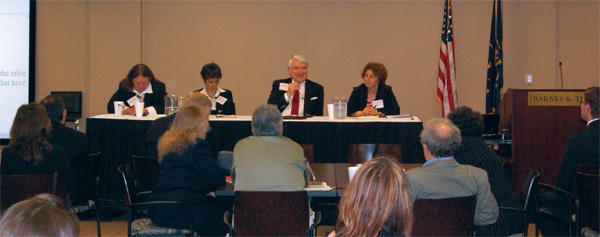“Because we’re here, I hope one less person is going to be a victim of domestic violence, one less person is going to be denied their benefits, one less person is going to feel shut out of the legal system that they thought was a promise to all of us.”
This was expressed by Justice Nathan Hecht of the Texas Supreme Court during the Access to Justice Workshop. The workshop was held on March 22nd and 23rd at the Statehouse and in the conference rooms of Barnes & Thornburg LLP. About 65 people participated in the workshop, which consisted of keynote speeches, panel discussions, and small-group conversations about the viability of creating an Access to Justice Commission in Indiana. Indiana Supreme Court Justice Steven David delivered the opening and closing remarks.
Speakers at the workshop were individuals with broad knowledge and experience in the formation of Access to Justice Commissions, and included Justice Hecht of the Texas Access to Justice Commission, Honorable Sarah Singleton of the New Mexico Access to Justice Commission, and Karen Lash, senior counsel of Access to Justice at the U.S. Department of Justice. Justice Hecht is a frequent speaker at access to justice workshops around the country, and the Texas commission is considered by most observers to be one of the most dynamic and successful. Judge Singleton, who is from Indiana, has helped with establishing a successful commission in a state that shares similarities with Indiana. Participants were drawn from a broad range of stakeholders including judges, members of the private bar, social service providers, librarians, people who are eligible to receive legal services, civil legal aid providers, advocates for the victims of domestic violence, and representatives of the physically challenged.

The idea for an Access to Justice Commission grew out of a Legal Needs Study that was conducted in 2007 and followed by a pro bono conclave in 2008. Both were examining the variety of civil legal needs facing low-income Indiana residents and the best way to respond to those needs. In 2009, a group of legal services providers and other stakeholders asked the Indiana Supreme Court to create an Access to Justice Commission. A working group was formed, consisting of representatives from the Indiana Pro Bono Commission, the Indiana Supreme Court Self-Represented Litigant Committee, the ISBA Pro Bono Committee, the Indiana Bar Foundation Board of Directors, the Pro Bono Conclave Working Group, and the Indiana Legal Service Board of Directors. This group submitted a refined proposal on April 8, 2010 that revised Indiana Rule of Professional Conduct 6.6 to address the creation of an Access to Justice Commission. The proposal received many comments, from which those involved concluded that there was a need for more discussion on the desirability of an Access to Justice Commission in Indiana and on the structure and function of such a commission.
On August 29, 2011, then Chief Justice Randall T. Shepard issued a letter to the working group concluding that further dialogue is needed regarding ways to improve delivery of legal services to the poor and the development of a long-term plan for doing so, as well as the aims, structure, and viability of a possible access to justice commission in Indiana. He directed the working group to hold an education and discussion workshop on these issues, bringing in outside speakers to educate stakeholders on Access to Justice Commissions in other states and conduct discussion on the possibility of establishing one in Indiana. His letter recommended that this workshop be followed up with a smaller task force to establish a detailed plan and implementation strategy.
State Court Administration staff reached out to the various members of the working group who put together the initial proposal, as well as those who commented on the proposal, to work on the planning of this event. An effort was made to be as inclusive as possible of all interested parties. The planning group consulted with Robert Echols, the Access to Justice Project Consultant for the American Bar Association, for advice on speakers and organization of the workshop. Mr. Echols provided the group with information about access to justice workshops in states similar to Indiana, and on which outside speakers would be most useful to the efforts.
After listening to success stories and talking about Indiana’s challenges, participants in the workshop largely felt that an Access to Justice Commission would be good for Indiana and instrumental in the goal of helping people gain better access to representation and to the courts. Ms. Lash exhorted the group to “not let perfection be the enemy of the good”, while Judge Singleton demonstrated how the development of an Access to Justice Commission had resulted in dramatic increases in funding for indigent representation in her state. A task force has been formed to begin drafting and refining possible proposals for the creation of a commission, with input from all stakeholders at two scheduled follow-up meetings. The task force consists of a small group of workshop participants and is headed by Allen County Superior Court Judge David Avery. The intent is to bring a proposal for the creation of a commission to the Indiana Supreme Court by early summer.